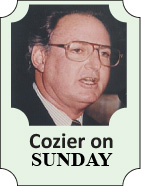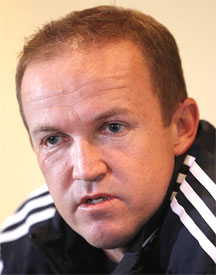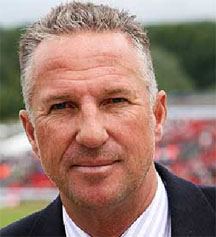A FIESTY debate has broken out in English cricket over the past few weeks.
As lively as it is, it hasn’t been accompanied by the acrimony that has for so long divided West Indies cricket. England are too successful at present for there to be constant doubts over the captain’s position, regular condemnation of the coach, relentless contempt for the board and disapproval of the selectors.
Yet it is England’s strength and West Indies’ weakness that has indirectly set off the argument over the policy of “rotation” – the resting of key players, mainly fast bowlers, during the current series.
For the third and final Test at Edgbaston, England omitted Jimmy Anderson and Stuart Broad and replaced them with Graham Onions and Stephen Finn. For the third and final (abandoned) ODI at Headingley, they stood down Broad, Graeme Swann and Tim Bresnan for fast bowler Stuart Meaker, all-rounder Chris Woakes and off-spinner James Tredwell.

Andy Flower, the former Zimbabwe batsman who is England’s coach, has been at pains to explain the reasoning behind the strategy. It is, he said, primarily to protect the main bowlers from physical or mental burnout and to extend their careers.
What is more, he noted, England’s cupboard, once bare, is now packed with adequate replacements who can benefit from the opportunities they are given. That both Test and ODI series were secured after two matches opened up that chance.
“We came into this series with one goal and that was to win the series,” was how he put it. “We’ve achieved that goal so our priorities do shift.” The shift was specifically towards the three Tests against South Africa in July and August, a contest between the International Cricket Council’s two top ranked teams, as against that against the West Indies, down at No.7. Flower said it wasn’t intended “to demean the importance” of the relevant matches but, clearly and predictably, self-interest came first. Flower’s reasoning has much, but certainly not unanimous, support.

Anderson didn’t hide his disappointment, even virtual disagreement, with his omission from the third Test. As with most cricketers, especially those at the top of their game, he is keen to play at every chance.
Ian Botham was among the influential voices strongly against “rotation”. Jonathan Agnew, the BBC’s cricket chief, was another.
Botham, typically blunt, termed it “madness”. It was, he wrote in his newspaper column, “an insult to the English public who pay their money to go and watch the best players in the land represent them on the field.”
Agnew, who bowled fast for England in four Tests in the 1980s, said that any self-respecting cricketer wanted to be chosen on merit, not because of the benefit of the ‘rotation’ system.
Apart from being a contradiction of the ICC’s repeated proclamation that Test cricket remains paramount, it is a slight to the opposition, in this case the West Indies. It is a certainty that England wouldn’t be practicing ‘rotation’ in an Ashes series.
Nor is England alone.

Its present state has transformed West Indies cricket from the most envied and sought after in the world game into a virtual irrelevancy. It explains why Australia, which could not get enough of the teams under Clive Lloyd and Viv Richards, have not scheduled West Indies for Tests in the main venues of Sydney and Melbourne for their last two tours.
It is why Sachin Tendulkar opted out of last year’s series in the Caribbean in order to rest for the following series in England (where India lost all four Tests and their No.1 ranking).
All this is an unmistakable sign of the times, as current coach Ottis Gibson has acknowledged.
“They are the No. 1 team in Test cricket, they have an abundance of talent and good players and they can rest a few players and bring a few in and for them it’s all good,” Gibson said of England’s changes. “For us it’s just trying game after game to get the right balance and try and win a game.”
The roles are now reversed. At the West Indies’ zenith, in the 1980s, the “rotation” engaged in by England entailed stabs in the dark rather than deliberate planning. In the 1988 series, for instance, they chose four captains and 23 players (Graham Gooch was the only one who survived all five Tests) and lost 4-0.
Yet, even in those heady days, changes, for whatever reason, were never part of the West Indies’ design. Winning was the only objective.

In five Tests in Australia in 1984-85, they used just 12 players, 13 in England earlier that year. And they had just as many Tests, ODIs and first-class matches and engaged in plenty of exhausting, long-distance travelling as they do now. There was another compelling reason why the idea of having a Test or two to rest was anathema to the main bowlers of the time.
Joel Garner says that the presence of very strong and eager stand-ins was an incentive to keep going.
He and Colin Croft got their first opportunity against Pakistan in 1977 when Wayne Daniel and Michael Holding weren’t fully recovered from injuries on the preceding summer’s tour of England. They immediately seized it, 33 wickets to Croft, 25 to Garner in the five Tests.
Daniel never regained a regular place, confined to 10 Tests over eight years, menacing batsmen for Middlesex in the English county championship instead. The equally dangerous Sylvester Clarke (11 Tests) was another who had to make do with county cricket as he couldn’t break into the hierarchy of the contemporary pace attack.
Should any second-pick bowler now claim 10 wickets in a Test, Flower might find it difficult to enlighten him on the meaning of ‘rotation’ when dropping him for the next match.
It is a conundrum that doesn’t concern the West Indies just now. If it ever does it would be comforting to know that, whoever the selectors and the coach may be, they would be guided by the example of earlier times and respect the game and their opponents by always putting their best team in the field.




